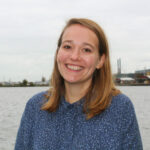Circular companies demonstrate how circular business models work in practice. Many examples can be found among startups, as well as small and medium-sized enterprises (SMEs), multinational corporations, and semi-public organizations, all providing examples of circular entrepreneurship. Below is a selection of Dutch companies with iconic circular products or projects.
Start-up
Closing the Loop
Through the ‘One for One’ program, Closing the Loop allows companies to offset the raw material consumption of new mobile phones at the time of purchase. This is achieved by linking the purchase to the collection and responsible recycling of an old phone, similar to carbon offsetting but for scarce metals.
Closing the Loop also employs the same approach to give discarded mobile phones a circular second life. By connecting each used phone purchased by a consumer in Africa on the second-hand market to the collection of a waste phone, they ensure that reuse does not contribute to more electronic waste. Closing the Loop establishes a collection structure (often non-existent) and generates income for the local population (Nederland Circulair, 2018).
Smartcrusher
Concrete is durable enough to last for centuries, but every kilogram of cement emits a kilogram of CO2. The current concrete and cement industry emits about three times as much CO2 as all airplanes combined. Crushed bits of concrete can currently only be used by producers as a low-value substitute for gravel.
SmartCrusher is a device that separates unused cement stone from concrete debris. It also produces high-quality residual streams of sand and gravel. The cement stone can be directly used in concrete production, saving cement and thereby reducing CO2 emissions. SmartCrusher can make 50% of the global concrete construction flow circular. The business model shows that companies and consumers can recoup their investment within 1.5 years, with the concrete price halving, without considering CO2 pricing (Nederland Circulair, 2018).
SME
Auping
Auping won the Circular Award Business with the development of the Revive mattress, which is entirely recyclable. In the Netherlands, 1.5 million mattresses are discarded every year, and mattresses are poorly recyclable, with most ending up being incinerated. The ‘Revive’ mattress, developed in collaboration with DSM-Niaga, provides a solution. It is a high-quality mattress with all materials suitable for reuse in a new mattress. Auping also offers the mattress through a leasing arrangement, creating a fully closed-loop system that allows for both refurbishment and recycling without downcycling (Auping, 2019).
Instock
Instock is the first restaurant in the Netherlands to literally and figuratively put food waste on the map. The creative chefs at Instock transform products that would otherwise not make it to the plate into delicious dishes.
Instock collects products that no longer have sales value for producers and supermarkets and sorts them in the Food Rescue Center. Instock supplies these rescued vegetables and fruits to hospitality businesses. Instock processes rescued potatoes into Pieper Beer and unsold bread into Bammetjes Beer. The beer mash leftover from brewing is used by Instock to make fiber-rich granola (Nederland Circulair, 2018).
Leadax
Leadax has developed the world’s first lead substitute from plastic waste with the same properties as traditional lead. The lead substitute is suitable as a water-resistant material, used, for example, around chimneys and skylights. The product is fully circular, cheaper than traditional lead, and safe for humans and the environment. Leadax won the Orange Trade Mission Fund (OHMF) in 2019 and has received several awards, including the Veluwse Innovation Prize in 2018 and the ING Circular Business Award in 2020.
In 2021, Leadax introduced a new product to the market: Leadax Roov. The sustainable roofing material Leadax Roov is fully circular and made from residual streams. With these circular construction products, the company demonstrates that it is possible to undergo a circular transition with a product while remaining profitable.
Multinational
Philips
In recent years, Philips has established itself as a leader in the circular economy with two products: offering light as a service through “Circular Lighting” and repurchasing used equipment by Philips Medical Systems.
With Circular Lighting, Philips manages and maintains the lighting. Philips developed this new business model for professional indoor lighting in collaboration with the Turntoo agency. The lighting installation remains the property of Philips, motivating them to create products that they can reuse, encouraging ongoing innovation in lighting (Nederland Circulair, 2016). Philips Medical Systems produces, among other things, MRI scanners. Philips actively preserves and sells used products in the second-hand market after refurbishment. This not only generates revenue but also allows Philips to maintain product quality and protect the brand’s reputation (Philips, 2019).
Vanderlande
Vanderlande is the world leader in baggage systems at airports, sorting systems for parcel and postal services, and a leading supplier of warehouse automation. In collaboration with cradle-to-cradle pioneer Michael Braungart, Vanderlande designed a circular conveyor belt called Blueveyor. This conveyor is designed to be easily and quickly disassembled, allowing Vanderlande to reuse all materials in a high-quality manner. The Blueveyor has fewer components, reducing the need for materials. Additionally, Vanderlande provides materials with a passport, allowing them to better track and efficiently deploy materials (Vanderlande, 2019).
Industrie
Ioniqa
Ioniqa Technologies discovered the key to creating an ‘everlasting PET bottle’ in its Eindhoven laboratory a few years ago. The startup developed an innovative process to convert various colors of plastic PET waste into virgin, high-quality, colorless raw material.
This process can be repeated endlessly, making the recovered raw material competitive in terms of both quality and cost. Furthermore, this circular process eliminates the need for oil.
Insus
The Dutch company InSus devised a method to recycle and process PU insulation material into high-quality raw material, preventing it from ending up in landfills. The company collaborates with FALK Bouwsystemen for the production of recycled sandwich panels in a completely closed process, with no gases escaping.
The recycled sandwich panels add value throughout the construction chain and come with a take-back guarantee. While the panels are approximately 5% more expensive, they offer tax benefits to the end user (Source: RVO).
Semi-public
Waternet
Since November 2018, Waternet, on behalf of the Amstel, Gooi, and Vecht Water Authority (AGV), has been a shareholder in AquaMinerals. This collaboration in the drinking water sector gives recovered raw materials a second life. The goal of this participation is to achieve profitable and sustainable outlets for AGV’s produced residual and raw materials.
Waternet and AGV have ambitious plans for energy and raw material recovery. Currently, they produce various residual and raw materials, such as phosphate in the form of struvite at the sewage treatment plant in Amsterdam West, as well as calcite granules or iron sludge produced during drinking water production. The new challenge for both parties is the utilization of screen material, grid material, sand, fat, and, in the future, dried sludge generated during wastewater treatment (Waternet, 2019).
De Circulaire Weg
The Infrastructure as a Service (IaaS) concept is a new form of collaboration with a novel contracting model to accelerate circularity in the infrastructure sector.
The partner program, De Circulaire Weg (DCW), investigates, through 7 pilot projects, whether ‘Infrastructure as a Service’ can be practically applied and how it can lead to increased circularity.
Based on the initial results of the pilot projects, valuable lessons and success stories can already be shared. Read the full final report here.
Ready to get started yourself?
If a company wants to apply circular principles in its operations, it can attend workshops at CIRCO. With support from the Ministry of Infrastructure and Water Management, CIRCO guides companies in discovering and implementing new circular business opportunities.
For more information, visit: https://circonl.nl/doe-mee/



